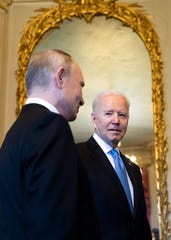Joe Biden, the U.S. president who in Geneva didn’t shame America like Trump in Helsinki

President Joe Biden and Russian President Vladimir Putin in Geneva, Switzerland, on June 16, 2021. (Photo: Peter Klaunzer/Keystone via AP)
America reclaimed some lost pride Wednesday when President Joe Biden met in Geneva with Russian President Vladimir Putin – and did so without bowing and scraping to a smug and devious autocrat.
That’s a low bar, to be sure. But it’s one that President Donald Trump failed utterly to clear – to the nation’s everlasting shame – when he held a meeting with Putin in Helsinki in 2018 and played supplicant to a man impervious to human rights concerns, who leads a nation with only a fraction of America’s economic prowess. (California’s gross domestic product is nearly twice that of Russia’s.)
The memory remains painful. After their two-hour talk, the details of which are still a mystery because only interpreters were allowed to sit in, the leaders emerged for a brief news conference, in which Trump praised Putin’s “extremely strong and powerful” denial of interfering in the 2016 U.S. presidential election.
‘I have President Putin’
“My people … said they think it’s Russia. I have President Putin; he just said it’s not Russia. I will say this: I don’t see any reason why it would be,” Trump told reporters.
So a U.S. president took Putin’s word over the findings of all U.S. intelligence agencies, both House and Senate intelligence committees, and his own director of national intelligence, Dan Coats, that Russia engineered a disinformation and cyber assault on U.S. democracy. And just three days before Trump’s comments, 12 Russian intelligence officers had been indicted in America on election interference charges.
Moscow’s most meddlesome man: Inflict a higher cost on Russia
Sen. Jeanne Shaheen: Don’t ignore Belarus
The late Sen. John McCain correctly called Trump’s actions “one of the most disgraceful performances by an American president in memory.”
The world might never know why Trump debased himself and the office of the presidency that day, or why he persisted with an odd affinity for dictators and autocrats throughout his tenure. But all of that seemed washed away Wednesday when Biden had his turn with Putin.
What happened after Geneva summit
For starters, the Biden administration disallowed a joint post-summit news conference, denying Putin equal-status imagery. (Each leader held his own.) The move left the Russian leader all alone Wednesday when he began spouting his usual whataboutisms as a mean of diminishing Western democracy, the existence of which is the true threat to his leadership.
If anything, the contrast with Trump’s 2018 summit was so stark, it was almost as if roles were reversed. Putin, who spoke to the news media first, complimented Biden as experienced, professional and a man of “attractive” moral values. “It seems to me we did speak the same language,” Putin said.
Biden, on the other hand, was anything but deferential.
“Let’s get something straight,” he told reporters. “We know each other well. We’re not old friends. It’s just pure business.”
Russia’s weapons and crimes
American presidents have a long history of dialoguing with adversaries, and Biden was right to arrange the summit. Russia, despite a sputtering economy largely dependent on oil and natural gas sales, still has more nuclear weapons than any nation. And its growing litany of crimes – from harboring cybercriminals who shut down American oil pipelines and food processing with ransomware, to interfering again in U.S. elections last November, to killing or persecuting dissidents like Alexei Navalny, to imprisoning former U.S. Marines on bogus charges – demanded Biden’s promise of personally setting red lines for the Russian.
All these and other issues were discussed Wednesday. Putin hinted at a resolution for the jailed Americans. Biden made clear that he would retaliate in kind for further cyber assaults: “If in fact they violate these basic norms, we will respond cyberly. He knows. In a cyber way.”
Whether real progress ensues remains to be seen. But the United States needed the cleansing experience of witnessing its leader engage in sober, necessary talks without humiliating himself or his country.
That alone made Geneva a diplomatic success story.
USA TODAY’s editorial opinions are decided by its Editorial Board, separate from the news staff and the USA TODAY Network. Most editorials are coupled with an Opposing View, a unique USA TODAY feature.
To read more editorials, go to the Opinion front page or sign up for the daily Opinion email newsletter. To respond to this editorial, submit a comment to [email protected].
Source: Read Full Article

